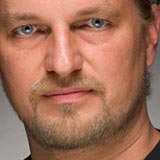[Un]design the un/defined
Grüezi, Sali and Hoi, dear Berlin design community,
Curious to peek at what happened at the industry event of the year? Eager to hear from and discuss with experienced community members? We'll give you VIP access to the stages of Interaction 23, going down in Zürich all of this week, and we'll come to you full of insights and takeaways after a week of profound thoughts on interaction design.
At our 82nd event, we are thrilled to present five speakers giving four original Interaction23 sessions: Hertje Brodersen, Tiia Leppänen, Samuel Huber, Sandra Griffel-Ripperger and Susanne Junglas. Discussing designer's purpose, through what we can better help developers, how prototyping should move from human- to planet-centric, and how we can demonstrate unignorable results to C-levels. See below for full session details.
Important:
- Due to high no show rates we need to overbook our events. Means, when the venue is full we will have to turn people away. No ticket no fun, but having a general ticket is NOT a guarantee for admittance. First come, first served.
- If you don't feel well, please play safe and join another time
After the talks, as usual, there will be room for discussion, questions and opinions. For post event drinks, we'll move over to a nice bar so feel free to join in later if you cannot make 7pm – Bar whereabouts to be posted to our #Berlin channel on the IxDA Slack.
See you there,
Designers Enable a Great Developer Experience
Tiia Leppänen, Lead Designer at NordcloudThe Covid situation gave a push for the companies to create better ways to work, especially remotely. Even before the pandemic, Developer Experience started to spread in the digital industry. For developers, many common pain points, use cases, and user journeys are recognized. There are many solutions in the markets which offer tools and platforms for the developers, e.g., to improve their efficiency and productivity.
How can designers help to improve the Developer Experience?
They are the experts researching user, and developers' needs.
They are experts in drafting user journeys and recognizing pain points.
They are experts in breaking the user journey into sections and creating a smooth pass through the stages that consider different types of touchpoints.
The Designers should treat the developers as any other users in any other projects. This might be challenging as the users are very close to the challenge, and already have new solutions clearly defined in their heads. But this situation is undoubtedly where the designers are needed – to bring people's ideas together and steer the ideation towards common technical, social, and communal solutions.
Rethinking design metrics - a holistic approach to measure impact
Sandra Griffel-Ripperger, Experience Design DirectorSusanne Junglas, Experience Design Director
Today, the concept of user-centered design with solution-oriented frameworks and design principles has gained traction in the industry and at the executive levels. But the challenges are becoming more complex. More and more factors are playing an increasingly important role in the decisions made about success and, more importantly, impact. If we want to create value, we have to think systemically and understand interacting, interrelated or interdependent areas holistically and in real terms and evaluate them or make them assessable. If we intend to make a tangible difference through our work as designers, we need to understand their impact on people, on business, on society and the environment in a nuanced way. Metrics play a critical, yet too underutilized role in this process. Their effective use offers the potential to clarify the role and purpose of design and produce tangible, resounding results - to which even the C-level cannot turn a blind eye.
Today, however, classic metrics are no longer sufficient for just that. The time for KPIs has passed. To make the experience, business and sustainability truly measurable, we have developed a framework within which all relevant factors are translated into clear metrics. In our session, which is an excerpt of a four hours workshop held at Interaction 23, we will show how to set up and maintain a system of metrics in different areas (experience, business and sustainability indicators) based on qualitative and quantitative data. The goal of our workshop is to build a holistic understanding and to provide tools that enable a systemic and holistic view and assessment beyond silos.
Prototyping for the Planet
Samuel Huber, Research fellow at the Zurich University of the ArtsWe have become masters in human-centered design. However, our hyperfocus on creating value for humans also has its downturns.
User Journeys, user Personas, user research – our methodologies are blindfolded and optimize only one element of what is indeed a system. If we continue to focus on humans alone, we will lead this system to collapse. Hence, let's overcome our egoism and start crafting in ecosystems. Planet-centric design offers an overdue recalibration of our designerly ways of working. However, when we no longer design solely for humans but the planet, complexity increases manifold.
Therefore, this talk explores how prototyping offers a powerful way to engage with human and non-human stakeholders beyond the design discipline. Eventually, design is no longer a mere tool, but a universal language like math and music that allows diverse groups to find answers to wicked problems collectively.
What is (job) love?
Hertje Brodersen, Design Leader / Experience StrategistThe job title "Designer" carries vague promises of creativity and self-expression. It's not necessarily a job you pick because you want to get rich fast. It's a job you are drawn to because you find meaning in it. "Find something you love to do, and you'll never have to work a day in your life", the promise goes.
What does this actually mean for designers? Working as a designer can be immensely fulfilling - you get to create things of beauty and effectiveness, you help people, you reinvent the world. Yet, this idea of design as a life-long passion project rather than a job may also open the door to unrealistic expectations of work as well as unhealthy work-life balances.
The pandemic has led most of us to re-evaluate the workplace and our role in it. In this talk, Hertje will take this prompt to re-evaluate what it means to love design and to work as a designer, and how to navigate the boundaries.
About our speakers
Tiia Leppänen
Tiia Leppänen has been working as a Lead Designer at Nordcloud since Nov 2022. She has been working for a client solution to create their own DX platform. She was also working together with their DX team which is the initial community for the developers later on. Inspired by the client project, Leppänen brought this topic also to Nordcloud's consideration, and currently, they are working on it internally, but also considering ways to help their clients with the topic. She is one of the DX topic leaders at Nordcloud.Sandra Griffel-Ripperger
As a director with a focus on strategic design at denkwerk - one of the leading digital agencies in Germany - Sandra Griffel-Ripperger accompanies companies in their digital transformation and develops ideas and concepts for innovative services and products. She has experience leading interdisciplinary teams of XD designers and analysts/researchers in developing sophisticated, insight-based solutions that align key business drivers with user needs. Her track record includes a number of strategic projects for global brands such as Condor, Motel One, TUI and Deutsche Telekom. Sandra also participates in local and international XD communities, speaks at meet-ups and conferences (UX Cambridge, Interaction 17 NYC, EuroIA 18) and writes articles and whitepapers, e.g. on contextual commerce, conversational interfaces, screenless interface development, testing methods, ….Susanne Junglas
Susanne Junglas is a Design Director at denkwerk with 15+ years experience in different design disciplines with deep expertise in service design, design thinking, research and future & foresight. At denkwerk she is responsible for outstanding digital solutions.Samuel Huber
Samuel Huber is on a mission to push Planet Centric Design to organizations of all kinds in his role as Strategy Director at Goodpatch, a global design firm that operates between Tokyo and Berlin. He has just completed a Ph.D. on the topic of strategizing as prototyping at the University of St. Gallen's RISE Management Innovation Lab and continues to explore the interface of research and practice.Samuel's fascination for wicked problems and curiosity for uncertain situations have provided him with a variety of experiences: He has been a founding member of UBS Y, the future think tank of the world's biggest wealth manager, worked long nights in a New York art gallery, and focused on development economics with Biovision. Now, Huber enjoys his work in interdisciplinary teams to conceptualize and develop anything from compression stockings to circular building technology platforms.
Previously, his studies in sociology, economy, management, and design led him to the Universities of Zurich, St. Gallen, and all the way to Stanford and Keio in Tokyo.



